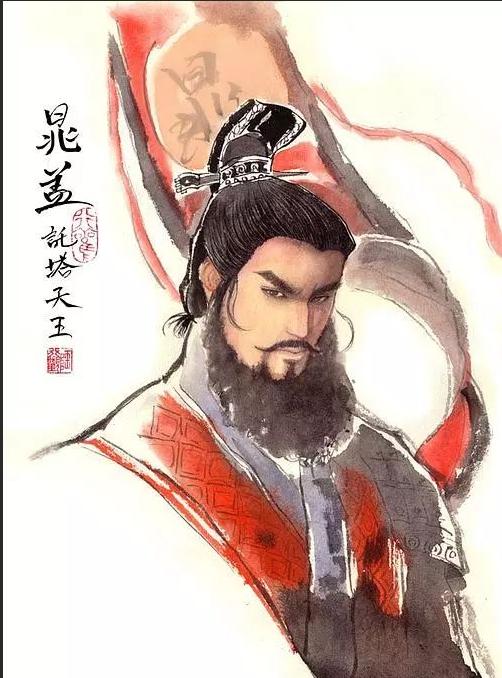The earliest record of Chao Gai's people is the "Thirty-six Praises of the Song River" written by Gong Kai (1222 ~ about 1302) of the Southern Song Dynasty, in this early material about the story of the Water Margin characters, the praise of the Iron Heavenly King Chao Gai is: "Visha Tianren, Chengzi Golden Body." Stubborn iron casting Ru, also out of the furnace. These four praises depict an iron man-like tower man, but the ranking of this iron king is only 34th, which shows that Chao Gai's status among the thirty-six people is very low, which is probably the closest to the true description of Chao Gai in history.

In the song and yuan dynasties of the work "Xuanhe Testament", the story of Chao Gai and Wu using wisdom to take the birthday of the gang also records that Chao Gai was the leader of Liangshan Po, but it was extremely short and played little role. In the folklore of southwest Lu, Chao Gai, Wu Yong and others were originally kings in Zhanshan Mountain. Thorny Liang Mountain, also known as Sili Mountain, is located about 50 kilometers north of Liangshan.
As the Song Dynasty sent a large army from Dongping Province to suppress it, Chao Gai and others had no choice but to shift their positions and merge with song Jiang's troops on liangshan to form an uprising army. After Chao Gai's rebels shifted their positions, the Song army set a big fire and burned their juyi hall and granary clean. To this day, there is still the former site of the granary in the southeast corner of the Thorny Mountain, and in the old site of the Juyi Hall on the north side of the granary, there is also a huge stone, and there are several stone caves on the boulder, which is said to be the flagpole seat where the rebel army planted the flag.
The masses in Yuncheng County also said that chao gai in history did have its own people. In the early years of the Qing Dynasty, Cao Yuke of Shouzhangzhi County, where Liangshan Po was located, wrote in the "Record of Passing Through Liangshan": "Chao and Song both had Hou Yu (Cheng). To this day, the chao surnamed chao people in chaozhuang village in the northwest of Yuncheng County, Shandong Province, all claim to be descendants of Chao Gai, and say that the Huangduiji in Yuncheng County is the Huangnigang of that year, and the Baiyuan Village in Yuncheng County is the hometown of Bai Sheng, the "White Sun Rat", and Bai Shengjing still exists. The Baisheng wine brewed by The HuangduiJi Distillery is brewed with the legendary ancient well water used for Baisheng sake brewing.
Based on the analysis of the above data, we can conclude that in the last years of the Northern Song Dynasty, Chao Gai really had his own people, and was also a member of the rebel army led by Song Jiang, who "raised Heshuo, turned to ten counties, and the official army did not dare to baby Qifeng". It was only surprising that Chao Gai's status in the rebel army was very low, far less than that stated in the "Water Margin", after going to Liangshan, he could continue to serve as the leader until he was killed by an arrow.